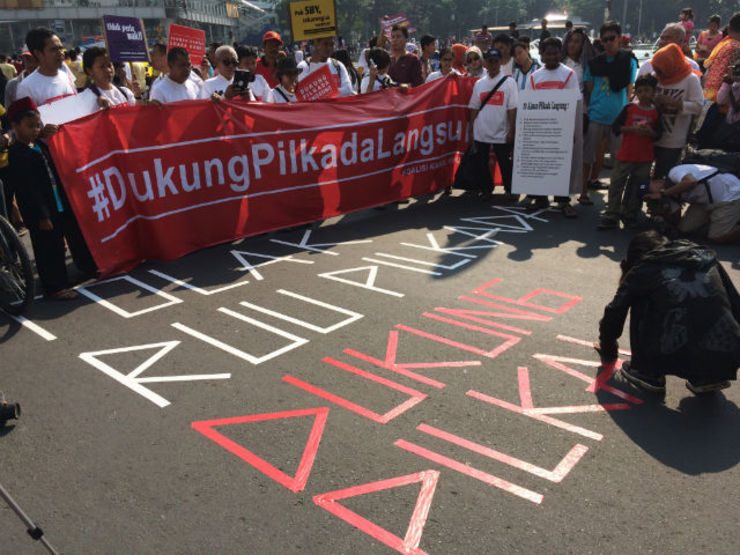SUMMARY
This is AI generated summarization, which may have errors. For context, always refer to the full article.

At a time when Indonesia has won widespread praise for electing a new president who emerged from the democratic reforms of the last decade, cynical political party interests used a lame-duck session of the legislature in the early hours of Friday to eliminate the direct election of local mayors and governor.
The action, which was made possible when outgoing President Susilo Bambang Yudhoyono’s party failed to vote down the measure, is a slap in the face for Indonesia’s young democracy. (READ: How Indonesians lost their direct local voting rights)
The move hands the power to appoint key local officials back to notoriously corrupt local legislatures, essentially restoring the opaque process in use under the authoritarian regime of the late President Suharto.
Direct elections of local officials began in 2004, a step that allowed popular new leaders like President-elect Joko “Jokowi” Widodo to emerge and challenge party bosses. Joko was elected twice as mayor of the small city of Solo starting in 2005 before moving on to become Jakarta governor in 2012. His ascension as a clean, reform-minded outsider would have been impossible under the system of appointed leaders, which resembled a marketplace that traded bribery and favoritism for power.
There are now numerous directly elected mayors, governors and district heads who have won public support for fighting corruption and trying to build popular democracy at a local level.
The passage of the measure, which is not subject to a presidential veto, occurred when Yudhoyono’s ruling Democratic Party walked out of the chamber late at night.
The 148 Democratic votes had been expected to go in favor of keeping the current system, but the lawmakers exited when a series of demands the party made were not agreed by other parties. The current session of the legislature expires in a few days.
The vote was opposed by Joko’s Indonesian Democratic Party of Struggle and its allies. It lost by a landslide. The measure will almost certainly be challenged in the Constitutional Court, where it could be voided.
In a sense the vote is hardly a surprise. Behind the scenes, veteran politicians have been scathing about the election of Joko, saying that he is inexperienced and out of touch. Friday’s vote appears to be nothing short of revenge. There is also widespread – if largely unspoken – fear that corruption prosecutions will increase markedly under Joko.
The measure was first put forward by Yudhoyono’s government and was then hijacked by forces allied with losing presidential candidate Prabowo Subianto, whose political coalition appears dedicated to derailing Joko even before he gets into office.
Parties aligned with Prabowo’s “Red and White Coalition,” named for the colors of the Indonesian flag, include the largest party, Golkar. The parties dominate the regional legislatures that will nominate local leaders and the move may be a bid by Prabowo to seize de facto control of the country through its regional leaders. (READ:Prabowo’s revenge? New bill puts voting rights at risk)
In any case, it is a step backward for Indonesia, which has been seen as perhaps the leading democracy in Southeast Asia. Prabowo lost the July 9 presidential election by about 8 million votes and subsequently lost a court challenge he filed to annul the result.
From the standpoint of the political elite here, Joko is a wild card whose ideas about democratic reform and anti-corruption measures – such as putting tax collection on line and other steps to bring more transparency to a perennially corrupt country – could upset the way business is done by established parties.
He has vowed, for example, to bring to heel an “oil mafia” of political insiders who have dominated the lucrative trade in imported fuel since the days of Suharto.
Most disappointing is the murky role of Yudhoyono in the setback for democracy. The president said publicly that he was in favor of continuing direct elections, a statement taken to mean his Democratic Party would vote down the measure.
But when the Democrats did not get agreement from other parties on a 10-point list of demands for reforming the current system, they left the House. Their absence allowed the measure to pass.
Yudhoyono, as party chairman, could have insisted they preserve direct local elections. Instead he did nothing. Given that his government drafted the anti-democracy bill in the first place, it is widely believed that the ten-point Democratic demands were a smokescreen used to hide the president’s actual support for the measure.
The Jakarta Globe newspaper, in an editorial, said the “ugly process” in the House of Representatives was a “massive setback to democracy.” The newspaper blamed the “the poorly named Democratic Party” and Yudhoyono for the debacle.
Supporters of the measure said they were motivated by a desire to cut costs and fight corruption associated with direct local elections, but few observers would put much credence in that argument.
At the heart of the issue is the fact Joko emerged from a reform system that allowed outsiders to rise to power. This has proven to be more than power brokers like Prabowo – and presumably Yudhoyono – are willing to accept. – Rappler.com
This piece is an editorial from Asia Sentinel.
Add a comment
How does this make you feel?
There are no comments yet. Add your comment to start the conversation.